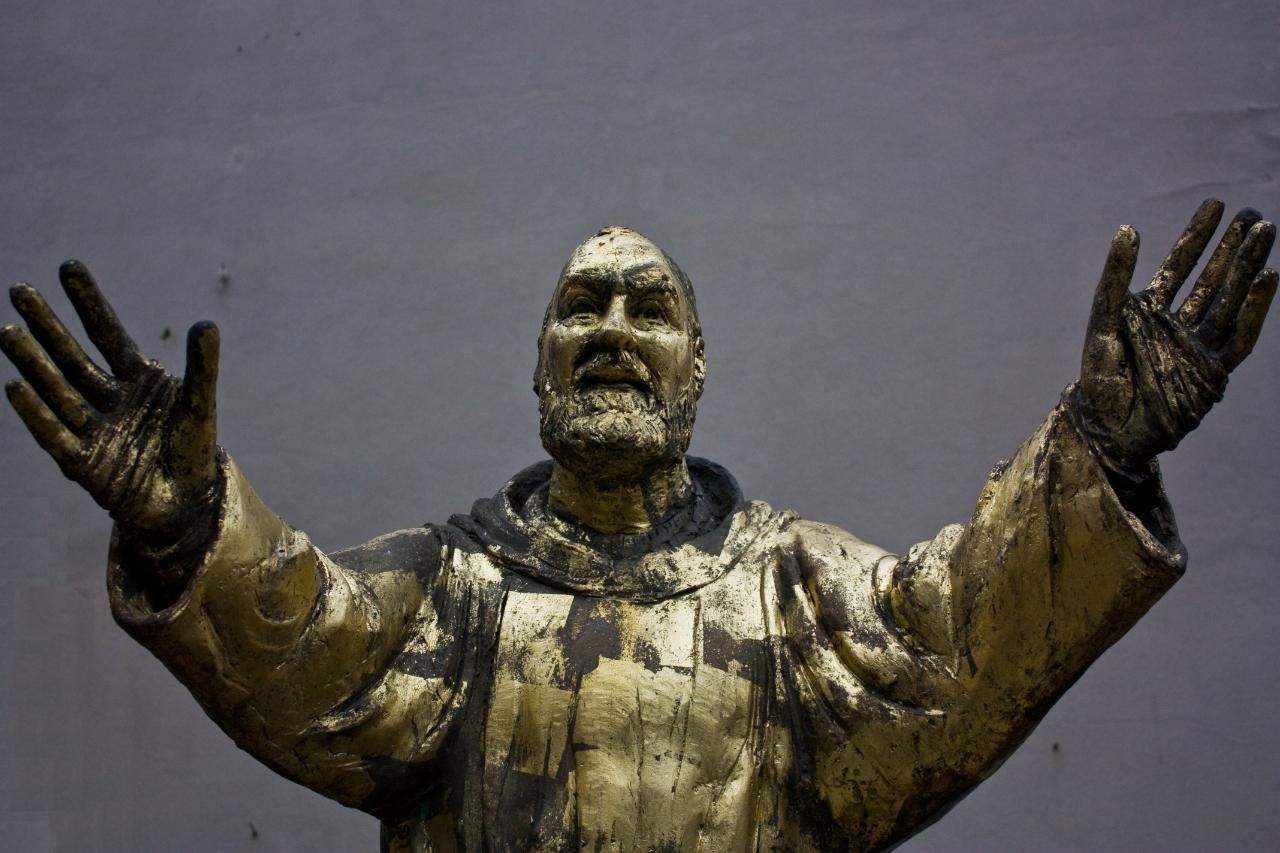One of Saint Leonard of Port Maurice's most famous sermons was "The Little Number of Those Who Are Saved." It was the one he relied on for the conversion of great sinners. In it he reviews the various states of life of Christians and concludes with the little number of those who are saved, in relation to the totality of men. Below is an excerpt from this famous sermon.
Introduction
Thanks be to God, the number of the Redeemer's disciples is not so small that the wickedness of the Scribes and Pharisees is able to triumph over them. Although they strove to calumniate innocence and to deceive the crowd with their treacherous sophistries by discrediting the doctrine and character of Our Lord, finding spots even in the sun, many still recognized Him as the true Messiah, and, unafraid of either chastisements or threats, openly joined His cause. Did all those who followed Christ follow Him even unto glory? Oh, this is where I revere the profound mystery and silently adore the abysses of the divine decrees, rather than rashly deciding on such a great point! The subject I will be treating today is a very grave one; it has caused even the pillars of the Church to tremble, filled the greatest Saints with terror and populated the deserts with anchorites. The point of this instruction is to decide whether the number of Christians who are saved is greater or less than the number of Christians who are damned; it will, I hope, produce in you a salutary fear of the judgments of God.
Brothers, because of the love I have for you, I wish I were able to reassure you with the prospect of eternal happiness by saying to each of you: You are certain to go to paradise; the greater number of Christians is saved, so you also will be saved. But how can I give you this sweet assurance if you revolt against God's decrees as though you were your own worst enemies? I observe in God a sincere desire to save you, but I find in you a decided inclination to be damned. So what will I be doing today if I speak clearly? I will be displeasing to you. But if I do not speak, I will be displeasing to God.
Therefore, I will divide this subject into two points. In the first one, to fill you with dread, I will let the theologians and Fathers of the Church decide on the matter and declare that the greater number of Christian adults are damned; and, in silent adoration of that terrible mystery, I will keep my own sentiments to myself. In the second point I will attempt to defend the goodness of God versus the godless, by proving to you that those who are damned are damned by their own malice, because they wanted to be damned. So then, here are two very important truths. If the first truth frightens you, do not hold it against me, as though I wanted to make the road of heaven narrower for you, for I want to be neutral in this matter; rather, hold it against the theologians and Fathers of the Church who will engrave this truth in your heart by the force of reason. If you are disillusioned by the second truth, give thanks to God over it, for He wants only one thing: that you give your hearts totally to Him. Finally, if you oblige me to tell you clearly what I think, I will do so for your consolation.
But why seek out the opinions of the Fathers and theologians, when Holy Scripture settles the question so clearly? Look in to the Old and New Testaments, and you will find a multitude of figures, symbols and words that clearly point out this truth: very few are saved. In the time of Noah, the entire human race was submerged by the Deluge, and only eight people were saved in the Ark. Saint Peter says, "This ark was the figure of the Church," while Saint Augustine adds, "And these eight people who were saved signify that very few Christians are saved, because there are very few who sincerely renounce the world, and those who renounce it only in words do not belong to the mystery represented by that ark." The Bible also tells us that only two Hebrews out of two million entered the Promised Land after going out of Egypt, and that only four escaped the fire of Sodom and the other burning cities that perished with it. All of this means that the number of the damned who will be cast into fire like straw is far greater than that of the saved, whom the heavenly Father will one day gather into His barns like precious wheat.
 I would not finish if I had to point out all the figures by which Holy Scripture confirms this truth; let us content ourselves with listening to the living oracle of Incarnate Wisdom. What did Our Lord answer the curious man in the Gospel who asked Him, "Lord, is it only a few to be saved?" Did He keep silence? Did He answer haltingly? Did He conceal His thought for fear of frightening the crowd? No. Questioned by only one, He addresses all of those present. He says to them: "You ask Me if there are only few who are saved?" Here is My answer: "Strive to enter by the narrow gate; for many, I tell you, will seek to enter and will not be able." Who is speaking here? It is the Son of God, Eternal Truth, who on another occasion says even more clearly, "Many are called, but few are chosen." He does not say that all are called and that out of all men, few are chosen, but that many are called; which means, as Saint Gregory explains, that out of all men, many are called to the True Faith, but out of them few are saved. Brothers, these are the words of Our Lord Jesus Christ. Are they clear? They are true. Tell me now if it is possible for you to have faith in your heart and not tremble.
I would not finish if I had to point out all the figures by which Holy Scripture confirms this truth; let us content ourselves with listening to the living oracle of Incarnate Wisdom. What did Our Lord answer the curious man in the Gospel who asked Him, "Lord, is it only a few to be saved?" Did He keep silence? Did He answer haltingly? Did He conceal His thought for fear of frightening the crowd? No. Questioned by only one, He addresses all of those present. He says to them: "You ask Me if there are only few who are saved?" Here is My answer: "Strive to enter by the narrow gate; for many, I tell you, will seek to enter and will not be able." Who is speaking here? It is the Son of God, Eternal Truth, who on another occasion says even more clearly, "Many are called, but few are chosen." He does not say that all are called and that out of all men, few are chosen, but that many are called; which means, as Saint Gregory explains, that out of all men, many are called to the True Faith, but out of them few are saved. Brothers, these are the words of Our Lord Jesus Christ. Are they clear? They are true. Tell me now if it is possible for you to have faith in your heart and not tremble. The Goodness of God
Perhaps you do not yet believe the terrible truths I have just taught you. But it is the most highly-considered theologians, the most illustrious Fathers who have spoken to you through me. So then, how can you resist reasons supported by so many examples and words of Scripture? If you still hesitate in spite of that, and if your mind is inclined to the opposite opinion, does that very consideration not suffice to make you tremble? Oh, it shows that you do not care very much for your salvation! In this important matter, a sensible man is struck more strongly by the slightest doubt of the risk he runs than by the evidence of total ruin in other affairs in which the soul is not involved. One of our brothers, Blessed Giles, was in the habit of saying that if only one man were going to be damned, he would do all he could to make sure he was not that man.
So what must we do, we who know that the greater number is going to be damned, and not only out of all Catholics? What must we do? Take the resolution to belong to the little number of those who are saved. You say: If Christ wanted to damn me, then why did He create me? Silence, rash tongue! God did not create anyone to damn him; but whoever is damned, is damned because he wants to be. Therefore, I will now strive to defend the goodness of my God and acquit it of all blame: that will be the subject of the second point.
Before going on, let us gather on one side all the books and all the heresies of Luther and Calvin, and on the other side the books and heresies of the Pelagians and Semi-Pelagians, and let us burn them. Some destroy grace, others freedom, and all are filled with errors; so let us cast them into the fire. All the damned bear upon their brow the oracle of the Prophet Osee, "Thy damnation comes from thee," so that they may understand that whoever is damned, is damned by his own malice and because he wants to be damned.
First let us take these two undeniable truths as a basis: "God wants all men to be saved," "All are in need of the grace of God." Now, if I show you that God wants to save all men, and that for this purpose He gives all of them His grace and all the other necessary means of obtaining that sublime end, you will be obliged to agree that whoever is damned must impute it to his own malice, and that if the greater number of Christians are damned, it is because they want to be. "Thy damnation comes from thee; thy help is only in Me."














0 comments:
Post a Comment
Thanks for leaving a comment. If you wish to submit a prayer request, however, please do so above, using the "Contact" tab.